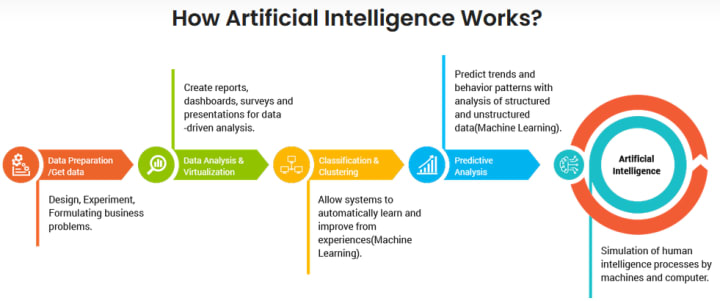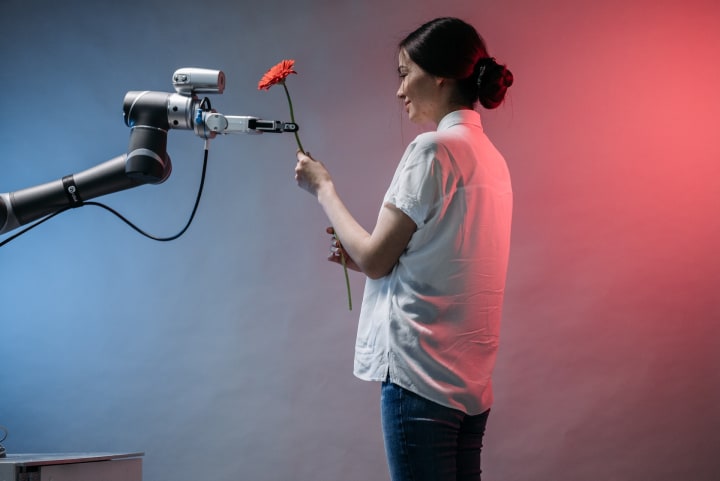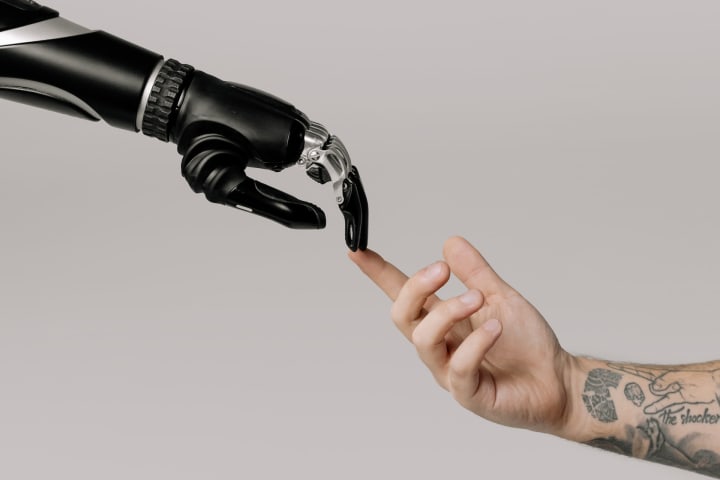
Top 10 Things You Must Know About AI
Introduction
Artificial intelligence (AI) has radically changed a number of industries and will continue to do so in the future. The enormous breakthroughs in AI, from virtual assistants to autonomous vehicles, have generated both enthusiasm and trepidation. In this article, we'll delve into the top 10 essential aspects you need to know about AI, demystifying its potential and its impact on society.

1. What is AI?
H1: Introduction
Definition of AI
Importance of AI in modern society
H2: The History of AI
The origins of AI
Milestones in AI development
H2: AI Applications in Various Industries
AI in healthcare
AI in finance
AI in transportation
AI in entertainment
H2: How AI Works
Machine learning
Neural networks
Natural language processing
H2: The Ethical Concerns of AI
Job displacement
Privacy and data security
Bias in AI algorithms
H2: AI and the Future
Predictions for AI advancements
The potential impact of AI on society
H3: AI's Role in Improving Healthcare
Diagnosing diseases
Personalized treatment plans
H3: AI Revolutionizing Finance
Automated trading systems
Fraud detection and prevention
H3: AI in Transportation for Safer Roads
Self-driving cars
Traffic management systems
H3: AI Transforming the Entertainment Industry
Recommendation systems
AI-generated content
H3: Machine Learning and Its Applications
Supervised learning
Unsupervised learning
H3: Understanding Neural Networks
Perceptron’s
Convolutional neural networks
H3: The Power of Natural Language Processing
Virtual assistants
Sentiment analysis
H3: Addressing Job Displacement Concerns
Reskilling and upskilling the workforce
Creating new job opportunities in AI
H3: Ensuring Privacy and Data Security in AI
Data anonymization
Transparent AI algorithms
H3: Mitigating Bias in AI Systems
Diversity in AI development teams
Regular audits and reviews of AI systems
Artificial Intelligence (AI) is no longer a concept of science fiction; it has become an integral part of our lives. In this article, we will delve into the world of AI, exploring its history, applications in various industries, working mechanisms, ethical concerns, and its potential future.
Introduction
The term artificial intelligence (AI) refers to the process through which computers are taught to think, learn, and solve problems in ways that are comparable to those that people do. Modern technology is now widely used and has an impact on many industries, including healthcare, banking, transportation, entertainment, and more.
The History of AI
The origins of AI can be found in early civilizations, where artificial beings were frequently depicted in myths and legends. However, modern AI research began in the 1950s, with significant breakthroughs in the 21st century. From the first AI program to deep learning algorithms, the journey of AI has been nothing short of extraordinary.
AI Applications in Various Industries
AI has revolutionized healthcare, aiding in disease diagnosis and suggesting personalized treatment plans. In finance, AI has streamlined processes, introduced automated trading systems, and enhanced fraud detection. The transportation industry has witnessed safer roads through the development of self-driving cars and intelligent traffic management systems. Even the entertainment sector has not remained untouched, with AI-powered recommendation systems and creative content generation.
How AI Works

At the core of AI are machine learning techniques, which enable systems to improve their performance based on experience without being explicitly programmed. Neural networks, inspired by the human brain, play a vital role in pattern recognition and decision-making. Natural language processing, on the other hand, empowers machines to comprehend and generate human language.
The Ethical Concerns of AI
While AI brings numerous benefits, it also raises ethical dilemmas. Job displacement is a major concern, as automation may replace certain job roles, necessitating the upskilling and reskilling of the workforce. Moreover, ensuring privacy and data security is crucial, as AI algorithms often handle sensitive information. Additionally, AI systems can inherit biases from their training data, leading to unequal treatment in various scenarios.
AI and the Future
The future of AI holds incredible potential. From improving healthcare outcomes to optimizing transportation systems, AI will continue to reshape industries and drive innovation. However, it is essential to proceed with caution, addressing the ethical implications and ensuring that AI's benefits are accessible to all.
AI's Role in Improving Healthcare
AI's ability to analyze vast amounts of medical data enables more accurate disease diagnosis. Moreover, AI can suggest personalized treatment plans based on an individual's unique characteristics and medical history.
AI Revolutionizing Finance
In the financial sector, AI-driven automated trading systems make split-second decisions, optimizing investment strategies. Additionally, AI enhances fraud detection, identifying suspicious activities and preventing financial losses.
AI in Transportation for Safer Roads
Self-driving cars, powered by AI, offer the promise of safer roads by reducing human errors. AI-based traffic management systems help optimize traffic flow and reduce congestion.
AI Transforming the Entertainment Industry
AI recommendation systems, widely used by streaming platforms, offer personalized content suggestions to users. AI-generated content, such as artwork and music, opens new possibilities for creative expression.
Machine Learning and Its Applications
Machine learning encompasses various approaches, including supervised learning, where models are trained on labeled data, and unsupervised learning, where models discover patterns in unlabeled data.
Understanding Neural Networks
The core of deep learning algorithms are neural networks. Perceptron’s, the building blocks of neural networks, process information and transmit it between layers of interconnected nodes.
The Power of Natural Language Processing
Natural language processing enables machines to understand and interact with humans through voice commands and written text. The application of NLP can be seen in virtual assistants like Siri and Alexa.
Addressing Job Displacement Concerns
To mitigate job displacement caused by automation, emphasis should be placed on upskilling and reskilling the workforce, preparing individuals for AI-driven roles and industries.
Ensuring Privacy and Data Security in AI
To protect sensitive user data, AI developers must adopt robust data anonymization practices and ensure transparency in AI algorithms to build trust with users.
Mitigating Bias in AI Systems
Developers must strive for diverse AI development teams to create unbiased algorithms. Regular audits and reviews of AI systems can identify and address bias-related issues.
2. The History of AI
The concept of AI dates back to ancient times, but its modern development began in the 1950s. The basis for AI research was set by pioneers like John McCarthy and Alan Turing. Over the decades, AI evolved through different phases, experiencing breakthroughs and setbacks, eventually leading to the advanced AI systems we have today.
3. AI Applications
AI's applications are vast and diverse, spanning across industries. From healthcare and finance to entertainment and transportation, AI has revolutionized processes and introduced new possibilities. AI-powered recommendation systems, fraud detection algorithms, and personalized virtual assistants are just a few examples of how AI is enhancing our lives.
4. Machine Learning
A branch of AI called "machine learning" enables systems to gain knowledge from data and develop over time without having to be explicitly programmed. It involves algorithms that identify patterns and make predictions, making it crucial for many AI applications, including autonomous vehicles and medical diagnosis.
5. Ethical Considerations
The rapid advancement of AI brings forth ethical challenges. Concerns regarding data privacy, AI bias, and the potential for job displacement need to be addressed. Striking a balance between technological progress and ethical responsibility is essential to ensure AI benefits humanity as a whole.
6. AI and the Job Market

AI's impact on the job market is a topic of significant debate. While AI has the potential to automate mundane tasks and improve efficiency, it may also lead to job displacement in certain sectors. Upskilling and retraining the workforce to adapt to the changing job landscape is crucial to embrace the benefits of AI.
7. AI in Healthcare

AI has the potential to revolutionize healthcare by accelerating drug discovery, improving diagnostics, and personalizing patient treatment plans. AI-driven algorithms can analyze vast amounts of medical data, assisting healthcare professionals in making more informed decisions and providing better patient outcomes.
8. AI and Creativity

Contrary to popular belief, AI is not limited to analytical tasks. It is making strides in the realm of creativity, generating art, music, and even creative writing. AI-powered tools are collaborating with human artists to produce novel and imaginative works, challenging the boundaries of human creativity.
9. AI and Security

As AI becomes more prevalent, the concern for cybersecurity also intensifies. AI can be leveraged to detect and prevent cyber threats, but it can also be exploited by malicious actors to orchestrate sophisticated attacks. Developing robust AI security measures is vital to safeguarding our digital infrastructure.
10. The Future of AI

AI's future holds both promise and uncertainty. Advancements in AI research continue at an exponential rate, with possibilities ranging from fully autonomous AI systems to the integration of AI with the human brain. As we navigate this technological frontier, it is essential to remain vigilant, ensuring AI's development aligns with human values and societal well-being.
Conclusion
AI is a transformative force that has the potential to shape the world in profound ways. As we harness the power of AI, it is crucial to understand its capabilities and limitations. Embracing AI ethically and responsibly will pave the way for a future where AI augments human potential and leads to a more innovative and inclusive society.
FAQs
Is AI dangerous?
While AI offers tremendous benefits, like any powerful technology, it can be misused. Responsible AI development and regulation are vital to mitigate potential risks.
Can AI replace human creativity?
AI complements human creativity but cannot replace the unique perspectives and emotional depth that humans bring to artistic expression.
How can businesses benefit from AI?
Businesses can leverage AI for data analysis, process automation, customer service enhancement, and gaining valuable insights for strategic decision-making.
What industries are adopting AI rapidly?
Industries like finance, healthcare, e-commerce, and automotive are among the early adopters of AI due to its potential for efficiency and innovation.
Is AI a threat to job security?
AI may automate certain jobs, but it also creates new opportunities and roles. Emphasizing lifelong learning and adaptability will be crucial in the future job market.





Comments (2)
I have a deal that we both can benefit from, here it goes, what do you think if we both read each other’s story like whenever you publish something I read it and the vice versa. I’ve already subscribed so if u r in just please let me know, and u for your time.
hi there good story